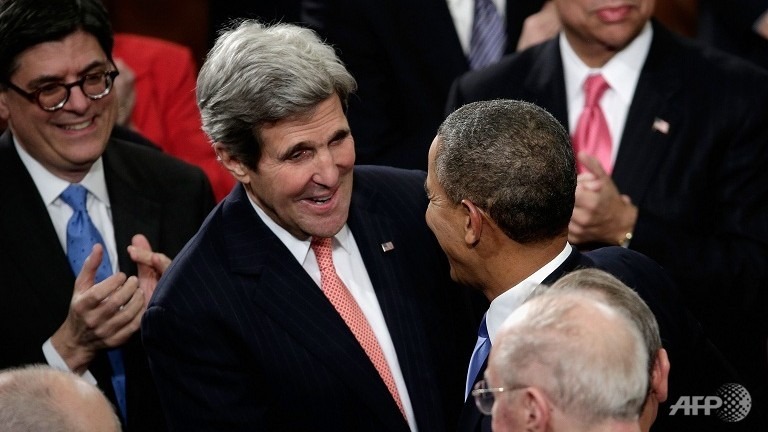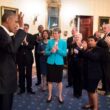It didn’t take much. Just the power of the presidency, the State of the Union, and the whole country watching. Plus the president’s will.
And AIPAC’s entire campaign to destroy America’s chance to reach an agreement with Iran crumbled. Within hours, three senators announced they were no longer co-sponsoring AIPAC’s bill to kill the Iran negotiations (Kirsten Gillibrand, Chris Coons and Joe Manchin), and AIPAC’s hopes to override Obama’s veto ended with a whimper, AIPAC’s whimper. On Feb. 2, former Secretary of State Hillary Clinton announced, in a letter to Sen. Carl Levin (D-MI) that she opposed the AIPAC bill and supported President Obama’s commitment to negotiations. And that was that.
No, this does not mean that AIPAC and Israeli Prime Minister Binyamin Netanyahu are giving up. At every critical junction during the process of reaching a deal with Iran they will be there working hard to subvert Obama’s effort. Their March conference in Washington (with 400 members of Congress in attendance) is already slated to be one massive “Bomb Iran” rally, with congresspeople and candidates pledging support for war in exchange for campaign cash. (I’ve been in the room and watched how they do it).
And they still might succeed, particularly if the Iranians give them any ammunition.
But it is less likely now, not after Obama issued his veto threat and asserted that he would continue to pursue diplomacy in the name of “our national interest” (not Israel’s, although an agreement is in Israel’s interest too, but our national interest). At that moment, with those words, Obama won and the lobby lost.
Think about it. For months AIPAC (and all its satellite organizations and neocon mouthpieces) had prepared for this moment. For a dozen years, the centerpiece of AIPAC’s annual confab has been fear-mongering about Iran and making members of Congress enact more and more sanctions bills. And then, since Obama announced his breakthrough, they lined up clear majorities in both houses to defeat him. Their favored cutouts Schumer, Kirk, Lindsey Graham, Menendez, Booker, and Hoyer have hollered that “this will not stand” and, yet, with two sentences, Obama crushed them.
It didn’t take much. Just the power of the presidency, the State of the Union, and the whole country watching. Plus the president’s will.
How badly? Sen. Menendez scurried for the elevators the second the speech ended, dodging reporters, and muttering that “the president has the right” to defend the national interest. So he does. Schumer had nothing to say. He really has no interest in the issue, he’s just dialing for dollars, while Kirk no doubt had to call headquarters.
No matter. The President won. And he showed how he can continue to win.
I’ve known that it could work this way for a long time.
In 1983 or thereabouts, during my four-year stint at AIPAC, I asked Tom Dine, its executive director, if a president of the United States could ever defeat the lobby, even in a case where US national security interests, and lives, were clearly at stake.
Dine responded that AIPAC could win on matters not directly related to U.S. national security but not on an issue that was.
He elaborated: We can never defeat a president who reaches over the heads of AIPAC and Congress and invokes his prerogatives as president of the United States or, even more, the national interest.
The logic behind Dine’s thinking was simply that American Jews would never allow themselves to be perceived as putting Israel’s interests over America’s because, to put it simply, they don’t. And the perception that they do is dangerous.
It is fine to strongly support the Israeli government even when it is at odds with the US government—but only up to a point. The point is when that support clearly contradicts US interests, as defined by the president.
That is why the lobby was so outraged when Reagan administration officials suggested the lobby’s opposition to an arms sale to Saudi Arabia represented the wrong answer to the question of “Reagan or Begin?” That little phrase—“Reagan or Begin”—won the battle for the administration.
That is why any criticism of the lobby that even hints at the lobby’s putting Israel’s interests above America’s produces such fury, hence the hysteria over the use of the term “Israel Firster.”
American Jews will not tolerate the suggestion that they are anything but good Americans. Fighting a president over a national security issue is simply not sustainable. Especially when it is only the fat cats of the lobby and not the Jewish community at large that is opposing the president. That is the case now.
It appears that the president is starting to understand that. Tragically, Obama is not likely to defeat the monied special interests on matters like guns or income inequality, but he can defeat them on foreign policy. That is because when it comes to matters like risking U.S. security and American lives, it is impossible for even the most powerful lobby to defeat him.
In essence, Obama asked, “which side are you on?” So long as that is the question, he wins. And so do us all.
M.J. Rosenberg was a Foreign Policy fellow at Media Matters For America. Previously, he spent 15 years as a Senate and House aide. Early in his career he was editor of AIPAC’s newsletter Near East Report. From 1998-2009, he was director of policy at Israel Policy Forum. Follow him @MJayRosenberg.






